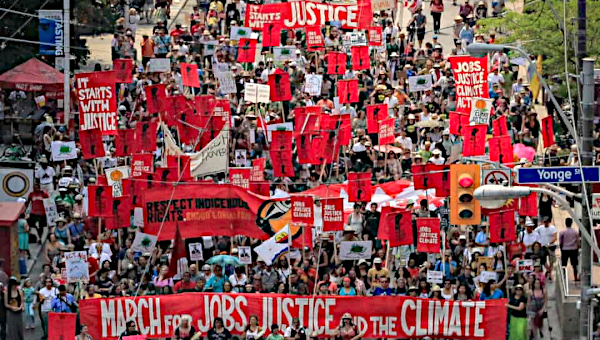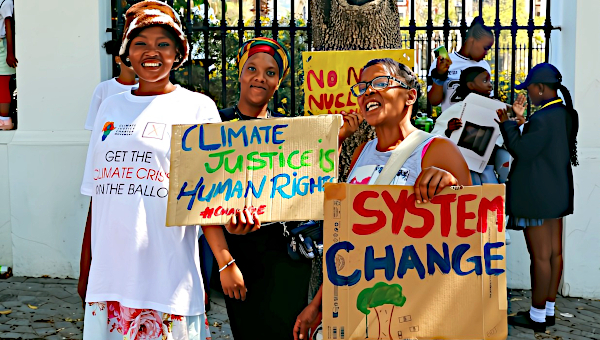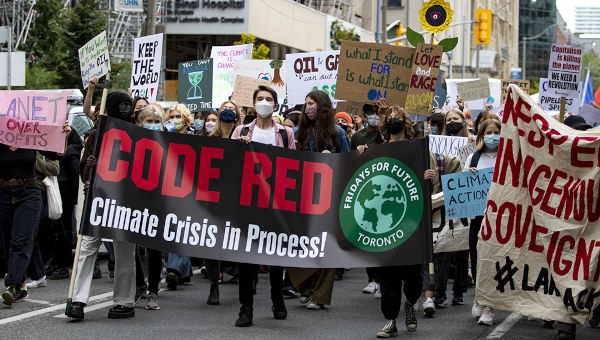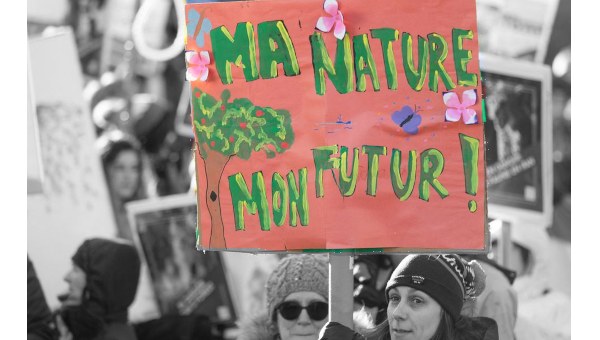Climate Change and Labour Precarity: A Worker-Centred Agenda
Just as the COP30 meeting in Belen, Brazil, has ended, the last week of November is Canada Climate Week Xchange. We could hope this is good news, but instead of the week’s activities being sponsored by traditional climate organizations or climate innovators, it is organized by the Toronto Stock Exchange.

Canada Climate Week stands out from other Climate Weeks across the globe – such as Climate Week NYC, PNW (Pacific NW) Climate Week, Panama City Climate Week – for its multi-city, nationwide approach. The week begins with an invitation-only Market Opening Ceremony at the Toronto Stock Exchange and continues with events centering on the fossil fuel industry – like the Petroleum Technology Alliance Canada’s session on “Practical Climate Solutions” – and on entrepreneurship – like the Climate Solutions Prize session “From Prize to Climate Impact: How Canadian Entrepreneurs are Deploying Innovative Tech.”
Instead of promoting real climate action, the week’s events are a study in what has gone wrong with efforts to address climate change across North America – exercises addressing climate change in elite sections of the private sector and in the hands of finance and the fossil fuels industry. It is industry-led innovation of “climate solutions” where adaptation replaces social transformation, basically, the inverse of mobilizations like the Green New Deal, Just Transition and Climate Emergency that BC progressives emphasize. With the conclusion of COP30, this is an opportune time to highlight the many ways that climate change – and efforts to both mitigate and stop it – are an issue for workers in BC.

Negative Climate Effects for Workers
Workers from a broad array of sectors – farmwork, construction, trades, transportation, utilities, equipment operation and manufacturing – report high incidences of heat-related illness during summer months. For agricultural workers residing on the farms where they work, the heat can’t be escaped at night. Food service workers also experience exposure to prolonged hours working in heat without access to hydration.
It is even worse for those who are temporary foreign workers, who work temporary contracts, gig workers, and those without protection of a union. People in these positions are structurally disabled from advocating for better working environments for themselves or their co-workers.
These precarious workers – people working outside of standard permanent employment relationships – make up just over half of the province’s workforce according to the Understanding Precarity in BC project. Women, especially racialized women, Indigenous people, those under 35, and non-citizens of various statuses are more likely to work in precarious employment situations than the general population. This also means they are more likely to experience exposure to climate-related risks and vulnerabilities. Some labour organizations in BC and beyond have begun to focus on this issue.

Addressing climate-related issues has shaped demands for revision of occupational health and safety rules. The Worker Solidarity Network’s framework, Too Hot to Work, advocates for a clearer maximum temperature policy along with proactive health and safety inspections that aren’t linked to employee grievances. Broader demands for open work permits or permanent status for immigrant workers, paid leave for extreme weather and climate-linked issues, free public transportation, minimum wage increases, the right to cool, and unionization for precarious workers would help protect workers in BC from climate precarity. As well, unionized workers can bargain for good working environments and for green practices that will help fight climate change to build a sustainable future.
A worker-centred agenda is needed for the climate transition, one that aligns with the International Labour Organization’s (ILO) Key Messages for COP30.
Both the ILO’s Key Messages and Canada Climate Week Xchange meeting themes include development of new industries, sustainable enterprises, and green investment mechanisms. The ILO, however, calls for these to be driven by social objectives to create decent work. This would include diverse stakeholders engaged in social dialogue and emphasizing upholding labour rights and international labour standards. All of this would strengthen social protection and occupational health and safety universally.
Climate change is accelerated by billionaires who would abandon the rest of us to a heating planet, bad housing, precarious jobs, exposure to heat, smoke and environmental pollutants, and endless surveillance and data harvesting.
The solution, however, isn’t to create new ways for billionaires to capture our social wealth. Rather, we must harness that social wealth to support us for generations to come. •





